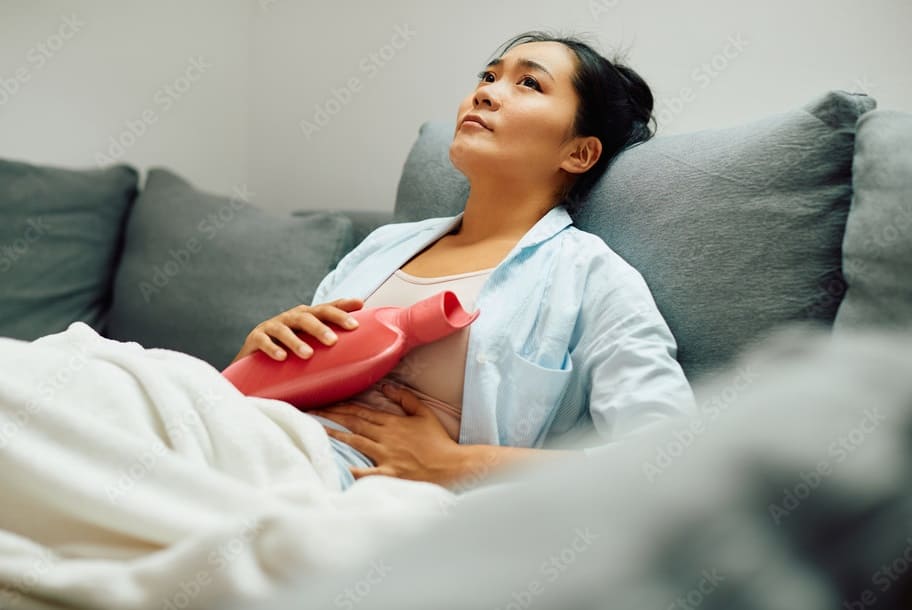Stomach pain can be a real bother, especially when you’re not sure why it’s happening. While many people automatically think of their menstrual cycle when they feel abdominal discomfort, there are plenty of other reasons your stomach might be giving you trouble. Let’s explore some of these possibilities and what you can do about them.
Digestive Issues
1) Indigestion: We’ve all had those days where we eat too much too quickly, and our stomachs protest. Indigestion can cause a lot of discomfort, with symptoms ranging from a bloated feeling to actual pain.
2) Gastritis: This is when your stomach lining gets inflamed. It can happen because of things like infections, excessive alcohol, or even just taking certain medications for a long time. It often feels like a burning sensation in your stomach.
3) GERD (Gastroesophageal Reflux Disease): GERD is when stomach acid keeps making its way into your esophagus. It’s not just about heartburn; it can cause a lot of discomfort and pain.
4) IBS (Irritable Bowel Syndrome): If your stomach feels crampy and bloated, and your bowel habits are all over the place, IBS might be the culprit. It’s a common condition, though, so you’re not alone!
Food Issues and Allergies
1) Lactose Intolerance: If dairy gives you a hard time, you might be lactose intolerant. This means your body struggles to break down lactose, the sugar in dairy, leading to bloating and pain.
2) Gluten Sensitivity: Some people can’t handle gluten, a protein found in wheat and other grains. If gluten doesn’t agree with you, it can cause stomach pain and other digestive issues.
3) Food Allergies: Allergies to certain foods like nuts or shellfish can cause pain and discomfort in your stomach, among other symptoms.
Infections and Illnesses
1) Stomach Virus: A common stomach bug can lead to nausea, vomiting, and diarrhea, along with stomach pain. It’s usually short-lived, but it’s no fun while it lasts.
2) Peptic Ulcers: These are sores that can form in your stomach lining or the first part of your small intestine. They can make your stomach burn, especially if it’s empty.
3) Appendicitis: If you’ve got sharp pain in the lower right side of your abdomen and it’s getting worse, it could be appendicitis. This is a serious condition that needs immediate medical attention.
Gynecological Issues
1) Ovarian Cysts: Sometimes, fluid-filled sacs on your ovaries can cause pain and bloating. This isn’t directly related to your period but can still be quite uncomfortable.
2) Endometriosis: This is when tissue similar to the uterine lining grows outside the uterus, leading to severe pelvic pain. It can be especially intense around your period.
Stress and Anxiety
1) Stress: Feeling stressed out or anxious can actually make your stomach hurt. It’s amazing how much our emotions can affect our bodies!
2) Psychosomatic Pain: Sometimes, our minds can trick our bodies into feeling pain. If you’re under a lot of stress, this might be contributing to your stomach discomfort.
Other Conditions
1) Hernias: A hernia happens when an organ pushes through a weak spot in your abdominal muscles. This can cause noticeable pain, especially when you move or lift something.
2) Gallstones: These are small, hard deposits that can form in your gallbladder. They can cause pain in the upper right side of your abdomen, particularly after eating fatty foods.
3) Constipation: When you’re having trouble passing stool, it can lead to cramping and discomfort in your belly.
When to Seek Medical Attention?
While many causes of stomach pain can be managed with some lifestyle changes or over-the-counter remedies, it’s important to seek medical advice if you experience:
- Intense or persistent pain
- Pain with fever, vomiting, or unexplained weight loss
- Blood in your stool or vomit
- Difficulty breathing or chest pain
Stomach pain can be a complex issue, but understanding the possible causes can help you find the right treatment and relief. If you’re not sure what’s going on or if the pain doesn’t go away, don’t hesitate to reach out to a healthcare professional. Your comfort and health are important, and getting to the bottom of your discomfort is the first step toward feeling better.
